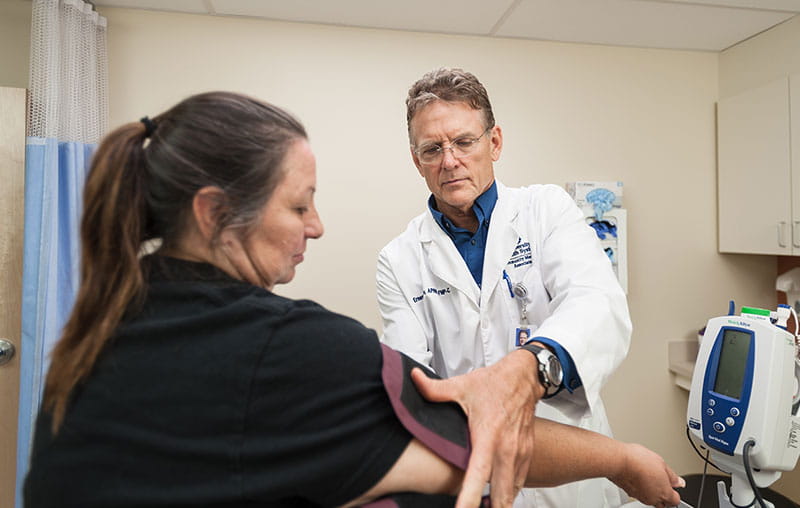If you pay attention to the news headlines, it may seem like there’s a new update about alcohol consumption and its effect on your health every few months. With all that information, it can be hard to know what’s what. So, is alcohol OK for your heart?
If you drink a beer or glass of wine sometimes, you aren’t alone. According to the American Heart Association, 85% of adults in the United States drink alcohol at some point during their lives.
The amount of alcohol consumed, though, varies widely from person to person. Average alcohol consumption is estimated at 2.5 gallons of alcohol per year, but many people drink far less than that and some people drink far more.
What impact does alcohol have on your heart? Dr. David Cardona Estrada, a cardiologist with the University Health Cardiovascular Center, dives into the science of alcohol and the heart.
How Your Body Processes Alcohol
Ever thought about what happens in your body after you drink alcohol? It’s a complex process — actually, a combination of processes.
There are two enzymes that play a big role in the process of metabolizing alcohol. They break apart the alcohol molecule so that it can be eliminated from the body.
When alcohol is metabolized, it turns into acetaldehyde, which is a known carcinogen, and then turns into acetate, a salt that’s often used as a solvent.
Other enzymes may be involved in the metabolization process, too, especially if you’ve consumed a large amount of alcohol. “Alcohol is also removed from the body by merging with fatty acids to form fatty acid ethyl, a compound that can cause damage to organs in the body,” said Dr. Estrada.
Before the alcohol can be fully metabolized and removed from the body, it dilates your blood vessels and makes your heart beat faster. Dr. Estrada notes this effect is usually temporary but is cause for concern if it lingers.
Alcohol-Related Heart Conditions
Many studies have looked at how alcohol consumption affects the heart and we know that drinking alcohol excessively can increase your risk of many different heart conditions.
In more simple terms, “It’s toxic to the heart,” said Dr. Estrada. “So much so, when you have one or more alcoholic drinks, your risk for cardiovascular disease increases.”
Atrial Fibrillation
According to the American College of Cardiology, having a single glass of alcohol puts a person at two times greater odds of having atrial fibrillation (AFib) within the next four hours.
The odds of having an episode of Afib, which occurs when the upper chambers of the heart beat quickly and erratically, increase as your alcohol intake does. Two or more drinks give you a threefold higher risk.
Blood Vessel Disease
Alcohol consumption can damage blood vessels, which can increase a person’s risk of conditions such as high blood pressure and atherosclerosis, the buildup of fatty plaque.
This, in turn, increases the risk of heart disease, heart attack and stroke.
Cardiomyopathy
Long-term heavy drinking can cause cardiomyopathy, which damages the heart muscle and keeps it from pumping blood to the rest of the body. This type of cardiomyopathy is called alcoholic or alcohol-induced cardiomyopathy.
Schedule an appointment with one of University Health’s primary care providers if you feel you need to see a cardiologist.
Myths Behind Alcohol Consumption
You might have heard a glass of wine is good for your heart. “This is not true,” Dr. Estrada emphasized. “No form or amount of alcohol lowers your risk of heart disease.”
So how much is too much alcohol when it comes to your heart?
The verdict is still out, but it’s best to limit yourself. The American Heart Association notes that if you don’t already drink alcohol, you shouldn’t start.
If you already drink, keep an eye on how much you’re drinking. Experts recommend limiting consumption to one alcoholic drink per day for women and two drinks per day for men. That’s the recommended maximum, not a minimum.
What counts as a drink? That varies depending on what you’re drinking and the alcohol by volume (ABV) of that drink. One alcoholic drink is:
- 12 ounces of beer at 5% ABV
- 5 ounces of wine at 12% ABV
- 5 ounces of distilled spirits at 40% ABV
Lowering Your Risk for Heart Disease
Lowering your risk of heart disease starts with a heart-healthy diet. Just as you would limit your salt, sugar and saturated fats, you would also limit your alcohol intake.
Getting regular physical activity promotes a healthy heart. It’s recommended to get at least 150 minutes of moderate physical activity each week, which is around 30 minutes of physical activity most days.
If you’re having a hard time limiting your alcohol consumption or need help cutting back, talk with your primary care provider, who can point you toward helpful resources.
Heart & Vascular Care at University Health
Your heart health matters.
Our team of cardiologists and other heart health specialists has years of experience in diagnosing, treating and managing conditions affecting the heart.
Learn more about the comprehensive heart care we provide at the University Health Cardiovascular Center.
Our heart care team is also backed by a nationally recognized group of nurses who have been designated gold-standard Magnet status, by the American Nurses Credentialing Center. This recognition means our organization achieves nursing excellence by providing quality patient care.

Heart disease is the leading cause of death for both men and women.
Our free online risk assessment only takes a few minutes. It will help you better understand your risk of developing heart disease and how you may be able to lower it.





